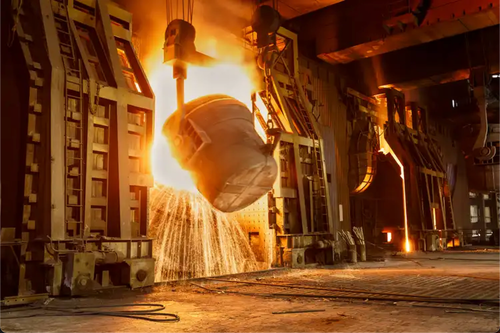Even though European power and natural gas prices have subsided this week, Germany, the largest economy in the bloc, still faces historically high energy costs that have forced cuts in industrial output.
The latest example is the world's largest steelmaker, ArcelorMittal, which released a statement Friday about shutting down two plants and idling one.
Europe's top steelmaker said two plants in Germany (one in Bremen and the other in Hamburg) would be partially closed at the end of September. A plant in Asturias, Spain, will also be idled.
ArcelorMittal blamed the coming smelter shutdowns on "the exorbitant rise in energy prices," which is devastatingly impacting the company's "competitiveness of steel production." The decision to reduce metal output was also based on "weak market demand and a negative economic outlook" as energy hyperinflation risks sending Europe into a deep recession.
"As an energy-intensive industry, we are extremely affected. With gas and electricity prices increasing tenfold within just a few months, we are no longer competitive in a market that is 25% supplied by imports," explained Reiner Blaschek, CEO of ArcelorMittal Germany.
Blaschek asked lawmakers to address the historic energy crisis and get prices "under control immediately." Elevated prices this summer have resulted in a series of smelter closures from other metal-producing companies because high energy costs made production uneconomical.
In Germany, one of every six industrial companies feels forced to reduce production due to high energy prices, a survey by the Association of German Chambers of Industry and Commerce, DIHK, showed at the end of July. Nearly a quarter of the companies forced to reduce production had already done so by end-July, and another one-quarter are in the process of scaling back production due to sky-high energy prices, according to the survey of 3,500 companies from all sectors and regions in Germany.
The energy-intensive industries and firms are particularly hit, as 32 percent of the companies plan to or have already started to reduce production and even halt entire production lines, the DIHK survey showed. -- Tsvetlana Taskova
Runaway energy costs were halted this week as German year-ahead electricity futures plunged by half since Monday's peak above 1,000 euros a megawatt-hour as the EU considers market interventions. EU NatGas prices closed down about 33% from the highs reached on Aug. 25.
However, here's where things get very dicey. After European markets closed, around the lunch hour in New York, news broke that Russian energy giant Gazprom won't resume critical NatGas supplies to Europe via Nord Stream 1 tomorrow after an oil leak was detected. There's no timeframe when NatGas supply will resume to the energy-stricken continent.
Europe's energy crisis could materially worsen, which means higher NatGas and power prices that will only curb more industrial output. Germany could fall into recession this winter, bringing the rest of the bloc down with it.

Commenti
Posta un commento